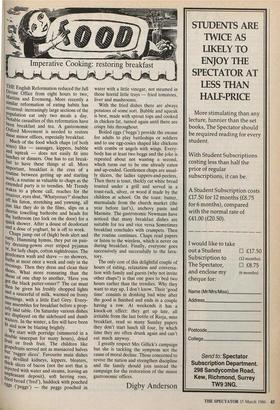Imperative Cooking: restoring breakfast
A THE English Reformation reduced the full Divine Office from eight hours to two, Mattins and Evensong. More recently a similar reformation of eating habits has occurred: increasingly large sections of the population eat only two meals a day. Notable casualties of this reformation have been breakfast and tea. A gastronomic Oxford Movement is needed to restore these minor offices, especially breakfast.
Much of the food which chaps (of both sexes) like — sausages, kippers, bubble and squeak — does not easily fit into lunches or dinners. One has to eat break- fast to have these things at all. More important, breakfast is the crux of a routine between getting up and starting Work, A routine as valuable to chaps as the extended party is to trendies. Mr Trendy Wakes to a phone call, reaches for the receiver, eyes shut, 'Whatyersay?' slouches Off his futon, stretching and yawning, all Just like they do in the films, slips on a Shortie towelling bathrobe and heads for 'ne bathroom (no lock on the door) for a quick shower. After a douse of deodorant and a dose of yoghurt, he is off to work. Chaps jump out of (high) beds alert and early. Humming hymns, they put on pais- 'eY dressing-gowns over striped pyjamas Or, for lady chaps, cotton nightdresses. The gentlemen wash and shave — no showers, baths at most once a week and only in the evenings. Then they dress and clean their shoes. What more reassuring than the shout of one chap to another, 'Have you got the black putter-onner?' The cat must then be given his freshly chopped lights and a saucerful of milk, warmed on frosty mornings, with a little Earl Grey. Every- 00e assembles for breakfast before a prop- erly laid table. On Saturday various dishes are displayed on the sideboard and dumb 1/. alters. In the winter, a fire will have been In and now be blazing brightly. We start with porridge (simmered in a u_ou.ble saucepan for many hours), dried fruit or fresh fruit. The children like raPefruits served not as massacred halves tit 'rugger slices'. Favourite main dishes a,re devilled kidneys, kippers, bloaters, t.n!cic slices of bacon (not the sort that is inlected with water and steams, leaving an nyleasant deposit), soft herring roes, °led bread ('fred'), haddock with poached eggs (Peggs') — the peggs poached in
water with a little vinegar, not steamed in those horrid little trays — fried tomatoes, liver and mushrooms.
With the fried dishes there are always potatoes of some sort. Bubble and squeak is best, made with sprout tops and cooked in chicken fat, turned again until there are crispy bits throughout.
Boiled eggs ('beggs) provide the excuse for adults to play battleships or soldiers and to use egg-cosies shaped like chickens with combs or angels with wings. Every- body has at least two beggs and the joke is repeated about not wanting a second, which turns out to be one already eaten and up-ended. Gentlemen chaps are usual- ly slicers, the ladies tappers-and-peelers. Then there is toast, thickly cut white bread toasted under a grill and served in a toast-rack, silver, or wood if made by the children at school. On the toast: butter, marmalade from the church market (the year before last's), anchovy paste and Marmite. The gastronomic Newmans have noticed that many breakfast dishes are suitable for tea and vice versa Sometimes breakfast concludes with crumpets. Then the routine continues. Chaps read papers or listen to the wireless, which is never on during breakfast. Finally, everyone goes successively and successfully to the lava- tory.
The only cost of this delightful couple of hours of eating, relaxation and conversa- tion with family and guests (why not invite other chaps?) is that one goes to bed two hours earlier than the trendies. Why they want to stay up, I don't know. Their 'good time' consists in drinking bad wine after the good is finished and ends in a couple having a row. At weekends it has a knock-on effect: they get up late, all irritable from the last bottle of Rioja, miss breakfast, read so many Sunday papers
they don't start lunch till four, by which time they are often drunk again and can't eat much anyway.
I greatly respect Mrs Gillick's campaign but she is tackling the symptom not the cause of moral decline. Those concerned to revive the nation and strengthen discipline and the family should join instead the campaign for the restoration of the minor gastronomic offices.
Digby Anderson


















































 Previous page
Previous page